- Home
- Richard Matheson
Shadow on the Sun Page 2
Shadow on the Sun Read online
Page 2
“Damn!” He let the curse go knifing into the wind-scaled rain and, for the effort, got his teeth wet. Damn it! He set his lips into a thin, trembling line. And why, he thought, why? For a pack of lice-infested, mule-eating Apaches! Damn them! The sullen, staring, brooding, leather-faced savages!
Captain Leicester dug his spurs in. “Come on!” he raged. “Come on, damn you!”
When David Boutelle, wet and uncomfortable, tried to guide his horse toward the White River Hotel, a swarm of animated townsmen swept him instead toward the Sidewinder Saloon. There, along with a laughing Finley, he was virtually lifted from his saddle by the cheering men and borne aloft toward the smoke-blue, shouting din of the barroom.
As the two of them were carried through the batwing doors, a cheer went up from the assemblage. Steins and glasses were banged on tables and bar, two-fingered whistles needled at the air.
Then Boutelle and Finley were lowered jarringly to the floor and guided by their shoulders to the counter where glasses waited and Appleface Kelly, dripping rain, slammed his hamlike palm on the dark counter and bellowed for whiskey. The barroom sounded deafeningly with boot-scuffling, ragged-cheering men as they pushed happily to the counter.
When every glass and stein was filled, Appleface slammed his palm on the counter again, and, at the pistol shot report of it and Appleface’s shout to “Hold it! Hold it!” everyone fell silent. Boutelle tried to get away, but he was held in a trap of smiling, eager men.
“Boys!” said Appleface. “This here’s a gala day! Our wives and kids can finally walk the streets of Picture City without bein’ scared of every shadow! We can work our jobs without expectin’ arrows in our backs from some damn, murderin’ Apache! And for that we got t’thank one man here.”
Appleface beamed and pointed at the Indian agent.
“Billjohn Finley!” he declared.
“Hooray for Billjohn!” shouted someone.
“Right!” said Appleface. “Hip, hip—”
“Hooray!” howled the men.
“Hip, hip—”
“Hoo-ray!”
“Hip, hip—”
“Hoo-RAYYY!” Boutelle winced at the ear-piercing noise.
Then there was only the sound of mass, convulsive swallowing, followed in seconds by the sounds of fiery coughs, stamping boots, and thick glasses being set down heavily on the counter.
Eddie Harkness and his uncle skimmed along behind the bar, uptilted bottles in their hands, gurgling amber bourbon into the glasses. Boutelle put down his glass, still three-quarters full, grimacing at the hot bite of the whiskey in his throat. He looked around for a way out. He’d made his gesture, now he wanted to go.
“And here’s to Mr. David Boutelle from Washington, D.C.!” yelled Appleface. “Hip, hip—”
“Hoo-RAY!”
Boutelle smiled thinly and tried to leave, but glasses were being raised en masse again and he was pressed in by the shoulder-to-shoulder drinkers. He took another sip of his drink and clenched his teeth.
Finley noticed the younger man standing in his wet clothes, and when the cheers had abated and the men had gone back to their separate groups of drinking and gaming, he worked his way over to Boutelle.
“You’d better go get yourself a change of clothes,” he said.
Boutelle smiled politely. “I intend to,” he said. He looked at Finley’s rain-darkened coat. “What about you?”
“Oh, I’m used to it,” Finley said pleasantly. “I’ve slept out many a night in wetter clothes than these.”
“You don’t talk like a native of these parts,” said Boutelle, finally getting enough room to take off his hat and shake the raindrops to the floor.
“I’m not,” said Finley. “I’m from New Jersey, but I’ve lived here over seven years.”
“Rutgers graduate?” asked Boutelle.
Finley nodded. “That’s how I got this job,” he said. Rutgers University was the sponsor for the Apache nation.
“I see.” Boutelle slid a clean square of handkerchief from his inside coat pocket and patted at the perspiration that scored his upper lip. The hot room was beginning to reek of steaming wool. This, added to the pungent odor of cigar and cigarette smoke, made Boutelle’s stomach edgy.
“Well, I’ve got to go now,” he said, picking up his hat.
“How long will you be staying in town?” asked Finley.
“Not long,” replied the younger man. “Just until the Apaches are established on the reservation.”
“Uh-huh.” Finley nodded. “Well, that should be about a day or two.”
“Mmm.” Boutelle put his handkerchief away. “We’ll see.”
Finley knew what the younger man was thinking, but he said nothing. Boutelle, like the majority of newly arrived people from the East, believed, quite firmly and—to them—logically, that the Indian nation was composed of treacherous savages, rarely to be taken at their word, never to be trusted. Indians were, like any wild animals, to be penned in, watched over, and kept from doing evil. Finley imagined that Boutelle was one of the legion who conceived of Indian reservations as some kind of open-air zoo.
He would say nothing, however. It was not his place to lecture. Besides, Boutelle would be gone in two days at the latest; there was no point in risking friction. Even if he did say something, it would not likely alter Boutelle’s trend of thought. Words rarely changed a young man’s attitude.
“Perhaps I’ll see you later in my office,” he said to Boutelle.
“Perhaps, Mr. Finley.”
Boutelle made his turn from the bar without noticing the approach of the small Indian. The first he saw of him was as an obstacle in his path, and he twitched back as the Indian ducked aside.
“What do you want, Little Owl?” Finley asked in the Indian tongue.
The old Apache glanced timidly at Boutelle, then looked at Finley once again, his dark eyes abject. At his right side, his hand rubbed slowly on the leg of his grease-stained buckskins as though cleaning itself.
Finley grunted once and reached into his pocket. His hand moved quickly to Little Owl’s and met it, palm to palm. The gesture took only a moment, and then the small Indian was padding down the length of the bar away from them.
“Did you give him drinking money?” Boutelle asked in surprise.
“Just a loan,” said Finley.
“I thought giving liquor to the Indians was against your principles.”
“As a rule, it is,” Finley said apologetically, “but—well, I guess I just can’t think of Little Owl as an Indian. He isn’t really anymore. He’s a hang-around-the-town Indian, hasn’t even got a tribe to call his own. He lives outside of town with his wife and children.”
“At the town’s expense, I presume,” Boutelle said acidly.
“No, no,” said Finley, lying a little. “Little Owl works during spring and fall roundups. He’s a pretty good little puncher.”
Boutelle glanced down the counter and saw the old, stolid-faced Apache carrying a stein of beer into the back room.
“He works with cattle?” Boutelle asked.
“Yes, quite a few Indians do,” said Finley, taking a cigar from his pocket. He bit off the end and spit it into the gaboon. “Not that they’re very good at it,” he went on, smiling. “They’re too timid with the stock.”
He chuckled at the expression on Boutelle’s face.
“You’ve never thought of Indians as being timid, have you?” he said, blowing out a cloud of smoke. “They are, though. They hate to take a risk, any kind of risk at all. That’s why they plan their battles so carefully. That’s why a chief like Vittorio has lasted so long. He figures things out to the last detail.”
“You sound as though you admire him,” said Boutelle. He was terribly uncomfortable in these sodden clothes and in the hot airlessness of the saloon, but it was his duty to learn as much as he could about the sort of man who was, after all, representing the United States of America.
“You have to admire a good general,
” Finley was answering easily, “even if he is your enemy. Didn’t we admire General Lee?”
“General Lee did not foment his war.”
“Neither did Vittorio, Mr. Boutelle,” the Indian agent said quietly.
The younger man cleared his throat.
“I fear we differ on several essential points,” he said.
Finley shrugged and grinned cheerfully. “That’s what makes life interesting,” he said.
Boutelle nodded curtly. “Yes. Well, I really must be getting back to the hotel. These clothes . . .”
“Yes, yes, by all means,” said Finley in honest concern. “Get yourself into a hot tub. Down some whiskey. Drive the wet right out of you.”
Boutelle managed a politic smile. He knew that Finley was elated at having brought these savages to bay after more than seven years of trying. He had a right to, of course. Even if he did conceive of them as noble primitives instead of the murderous brutes they were.
“You wish to see my report before I send it off to the Capitol?” he asked.
“No, no, I’m sure it’ll be fine,” Finley said amiably.
“Very well.” Boutelle nodded once and turned away.
Finley watched the younger man pick his way across the crowded saloon floor. Twenty-five years old, he thought, maybe twenty-six. Graduate of Yale most likely, maybe Harvard. Father in the law profession or in some legislature or both. Maybe even in Congress. Mother a society grande dame in New York City, Boston, some such place. His future a well-secured plan: politics, a proper wife and children, respectability, the quiet dignity which true wealth makes easier. The descent, more than likely, into stodgy complacence, into . . .
And, then again, maybe not, thought Finley with a self-deprecating shrug. It was unjust of him to write the young man off so easily. Was he, at thirty-seven, already taking on the dogmatism of old age? No sense in planning the poor boy’s future all at once. There were always shadows in a man’s personality that hid surprises. Besides, he was too happy today to feel critical of anyone. Appleface Kelly was right. It was, by God, a gala day!
Finley grinned at Kelly as the bulky man sidled up to him.
“Say that Boutelle is a stiff-neck, ain’t he?” said Kelly.
“Oh, he’s all right,” said Finley. “What’s your pleasure, you great hulk?”
Kelly ordered whiskey and put it away with immaculate speed. Flushed from drink, his face was almost to the color of his name.
Al Corcoran came in at four.
Just before he did, Finley had slipped back to his hotel room for a change of clothes. Now he was back at the saloon, chatting with Kelly.
“Somethin’ I always wondered,” said Appleface. “Who in Sam Hill named you Billjohn?”
“Simple,” Finley answered. “My father wanted to call me Bill and my mother wanted to call me John.”
“So they struck them a bargain!” said Appleface.
“Right!”
The two of them were laughing when the double doors were pushed open and the tall, heavyset man came in, dark slicker dripping. Stopping at the foot of the counter, he looked around the crowded room, his eyes coldly venomous beneath the shadowing brim of his Stetson.
When his gaze reached Finley, he came walking over.
“Hello, Al,” Finley greeted him. “How’d it—”
“You seen my brothers?” Corcoran interrupted.
Finley’s smile faded. “No, I haven’t, Al,” he said.
Corcoran’s lips flared back briefly from gritted teeth.
“Anything wrong?” asked Finley.
“I just told ya,” Corcoran said angrily. “I don’t know where they are.”
Finley nodded. “Perhaps they went out to watch the meeting with Braided Feather. A lot of—”
“Then where are they now?”
“They might have decided to take cover somewhere until the rain lets up.”
“They had work t’do,” said Corcoran, by the statement indicating his disagreement.
“I see.” Finley shook his head. “Well, I don’t know what to suggest, Al. I wouldn’t worry about it though.”
“No, you wouldn’t,” Al said bluntly. “You like Injuns.”
Finley looked surprised. “What?”
“You heard me.”
“I heard you, but I don’t believe I—”
Finley broke off and stared at Corcoran in rising amazement.
“Al, are you trying to tell me—” he began.
“If those goddamn Apaches have anything to do with this,” said Corcoran, “you can kiss your treaty good-bye.”
Finley set his glass down heavily.
“Have you any reason at all for saying that?” he demanded.
“I said it,” snarled Corcoran.
Finley pressed down the tremor of anger rising up inside him. “Listen, Al,” he said, trying to take Corcoran’s arm.
The brutish man pulled away.
“Al, you’re wrong,” said Finley. “You have no reason to—”
“They’re my brothers, Finley,” Corcoran said tightly.
“I know who they are, Al,” said Finley. “And I’m telling you that the Apaches had nothing to do with them not showing up.”
“They better show up soon,” said Corcoran.
Finley’s breath shook a little.
“They will, Al,” he said quietly.
“They better.”
Finley gestured, trying to clear the air. “Look, Al, if I can help you—”
He broke off abruptly and stood there watching Corcoran move for the doorway. He kept staring at the doors even after they had stopped swinging behind Corcoran’s quick exit.
“What?” He started to turn to face Kelly.
“You think the Apaches could’ve—”
“No,” snapped Finley, “I don’t.”
But his fingers on the glass, when he picked it up, were white across the knuckles. And after he’d swallowed half the drink, he set it down and paid for it.
“I’ll see you later,” he said.
“Y’need some help?” asked Appleface.
“No, that’s all right,” said Finley. “I’m just going to help Al find his brothers. I’m sure they’re somewhere in town.”
“You worried, Billjohn?” asked Kelly.
“No, no, of course not,” said Finley, forcing a smile, “but Al is.”
He patted Appleface’s shoulder. “I’ll see you later,” he said.
The smile began to fade as he turned away from Kelly. Before he reached the doors it was completely gone, and all the pleasure of the consummated treaty had turned into a cold, nagging distress.
3
Little Owl sat wondering what his brain looked like. In his youth, he’d watched two of his older brothers kill a white man. They had picked up the white man by his feet and smashed his head open against a rock. What had spilled across the dry surface of the rock had been the white man’s brains, they’d told him. It had looked grayish, wet and slippery. It was still throbbing when he touched it.
But that was long ago. He could not understand why he should be thinking of it now. He had only been a small boy when it happened. Had it meant so much to him that now, when he was old, he should sit thinking of brains and wondering what his own looked like?
Abruptly, he remembered. Last week—or was it last month?—Doctor Phil had talked to him, right here in this room behind the barroom of the Sidewinder. Doctor Phil had been drunk. He drank a lot because he, too, was often tired and wanted to forget his tiredness. And he had been here, sitting across the table from Little Owl, telling him what his brain would look like if he kept on drinking.
The old Apache could not remember what Doctor Phil had said. Something about a sponge eaten away, he thought. He couldn’t recall exactly. Memories were evasive now, uncertain in time and content. As if, somehow, it had rained in his head and everything was soaked together into a common, irresolute mash.
The thought amused Little Owl. Outside it was
raining—he could hear it falling in the alley beyond the window—and in his head it was raining, too. The spaces between his brain matter were like alleys between the buildings of Picture City—muddy and dark. He was destroying his brain by a rain of beer and whiskey. Yes, that was what Doctor Phil had said.
Or was it?
Little Owl opened his eyes slowly and stared at the grain of the table. He looked at the limpness of his hands lying on the table with the empty, foam-flecked stein between them. What time was it? he wondered. Was it nighttime? Or was it morning? No, it couldn’t be morning because, out in the other room, he could still hear the laughter and talking of the men, the clinking of glasses, the occasional scrape of a chair leg on the floor.
Little Owl straightened up with a soft groan. He had been slouched in the chair and his back hurt. Maybe he should leave the saloon and return to his wickiup, he thought. Yes, that was what he’d do. He watched his leathery hands slide off the table and felt them settle on the arms of the chair. Pushing down, he got himself into a standing position, his legs limp and watery beneath him. Everything around him was hazy at the edges, as if he were looking through the parting in a mist. Only those things he looked at directly had any clarity of line.
Little Owl walked across the room with careful deliberation. Maybe Finley was still there, he thought. Maybe Finley would give him some money to buy a stein of beer. Then he could go back to the table again and drink some more. He liked the feeling it gave him to drink, the numb, bodiless sensation. When he was deep in it, he could return to the village in the mountains and be a boy again. He could run and laugh and wrestle in the clean, high air, ride horseback again, shoot his bow and arrow, fish in the cold, rushing streams. In memory, he could fill his stomach with roasted meat and lie, at peace, in the thick, hazy warmth of his father’s wickiup.

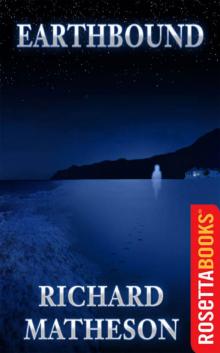 Earthbound
Earthbound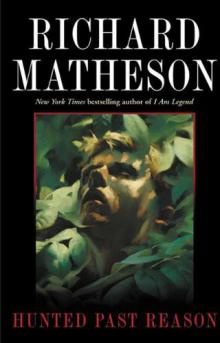 Hunted Past Reason
Hunted Past Reason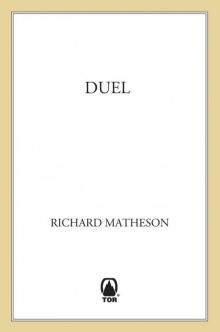 Duel: Terror Stories
Duel: Terror Stories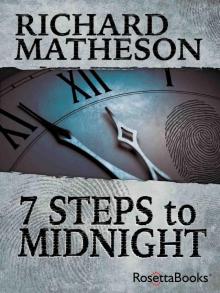 7 Steps to Midnight
7 Steps to Midnight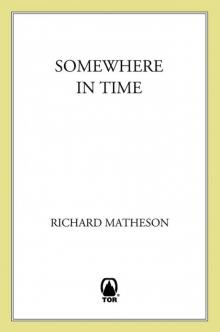 Somewhere in Time
Somewhere in Time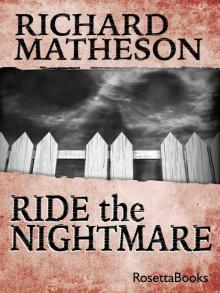 Ride the Nightmare
Ride the Nightmare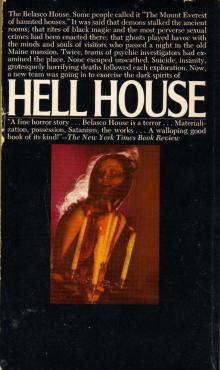 Hell House
Hell House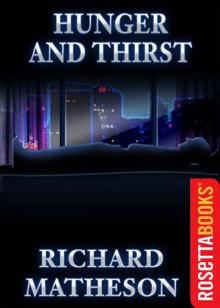 Hunger and Thirst
Hunger and Thirst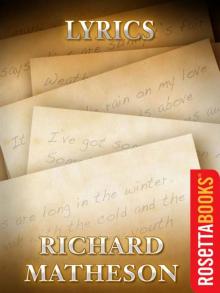 Lyrics
Lyrics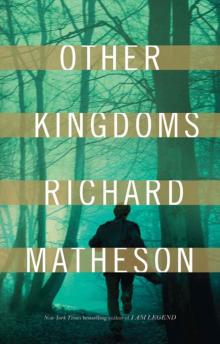 Other Kingdoms
Other Kingdoms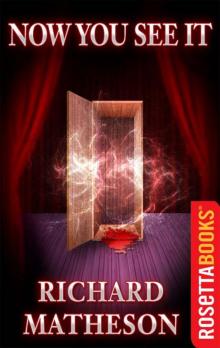 Now You See It . . .
Now You See It . . .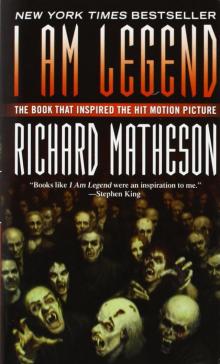 I Am Legend
I Am Legend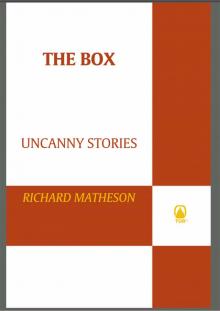 The Box: Uncanny Stories
The Box: Uncanny Stories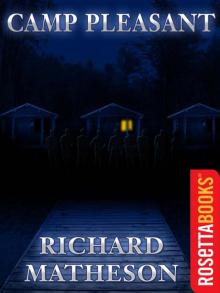 Camp Pleasant
Camp Pleasant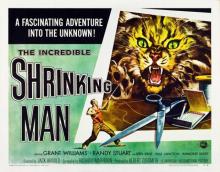 The Incredible Shrinking Man
The Incredible Shrinking Man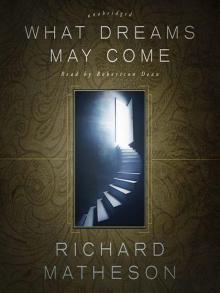 What Dreams May Come
What Dreams May Come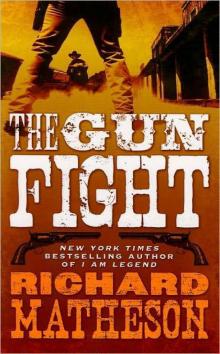 The Gun Fight
The Gun Fight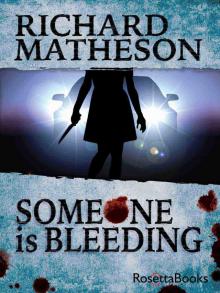 Someone Is Bleeding
Someone Is Bleeding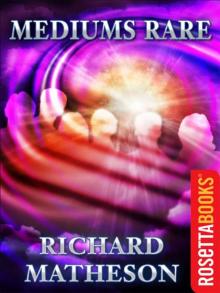 Mediums Rare
Mediums Rare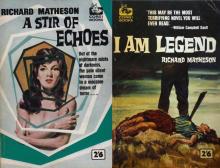 A Stir of Echoes
A Stir of Echoes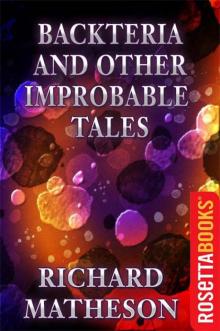 Backteria and Other Improbable Tales
Backteria and Other Improbable Tales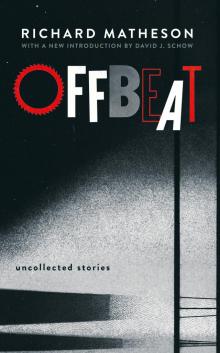 Offbeat: Uncollected Stories
Offbeat: Uncollected Stories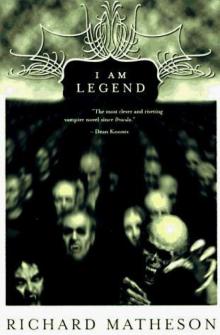 I Am Legend and Other Stories
I Am Legend and Other Stories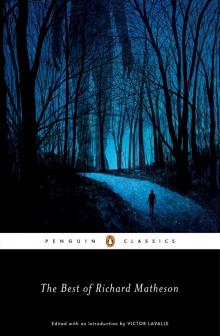 The Best of Richard Matheson
The Best of Richard Matheson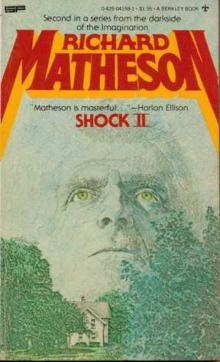 Shock II
Shock II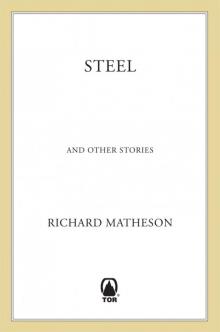 Steel: And Other Stories
Steel: And Other Stories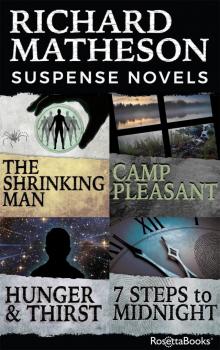 Richard Matheson Suspense Novels
Richard Matheson Suspense Novels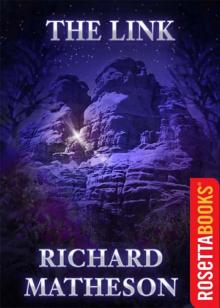 The Link
The Link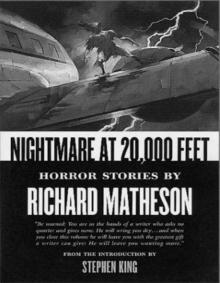 Nightmare At 20,000 Feet
Nightmare At 20,000 Feet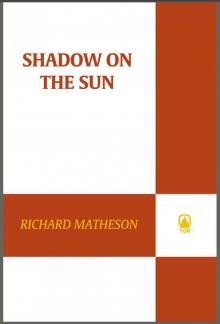 Shadow on the Sun
Shadow on the Sun![Steel and other stories [SSC] Read online](http://i1.bookreadfree.com/i/03/21/steel_and_other_stories_ssc_preview.jpg) Steel and other stories [SSC]
Steel and other stories [SSC]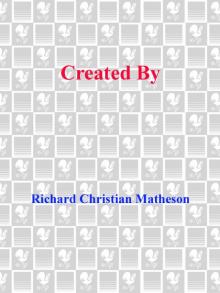 Created By
Created By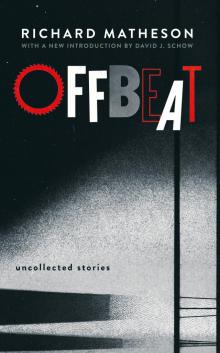 Offbeat
Offbeat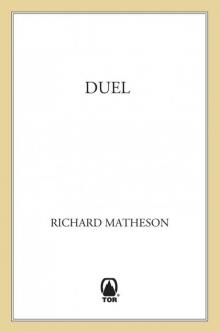 Duel
Duel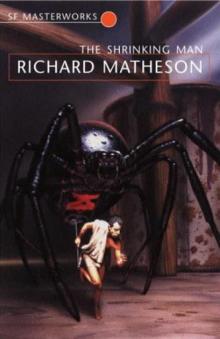 The Shrinking Man
The Shrinking Man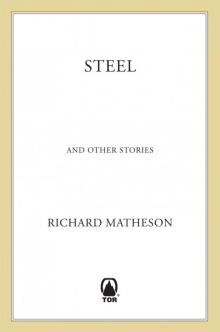 Steel
Steel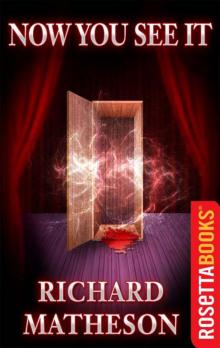 Now You See It
Now You See It